What are Egg Incubators
Egg incubators are specialized devices designed to create the perfect environmental conditions for egg hatching. These controlled environments replicate the conditions that would be provided by a brooding hen, including temperature, humidity, and turning the eggs at regular intervals. Egg incubators are essential tools for poultry farmers, bird breeders, and hobbyists who aim to hatch eggs consistently and efficiently without relying on the hens themselves. They play a crucial role in ensuring the viability and health of the embryos within the eggs, leading to successful hatch rates.
The primary users of egg incubators are those involved in poultry farming or aviculture who wish to have greater control over their hatching process. This includes small-scale backyard farmers, large commercial hatcheries, educational institutions, and research facilities. By using an incubator, these users can optimize hatch rates, manage large numbers of eggs simultaneously, and schedule hatches outside of the breeding season.
The principles behind how egg incubators work are rooted in recreating the biological conditions provided by mother hens. A critical element is maintaining a stable and appropriate temperature inside the incubator since embryonic development is highly temperature-dependent. Most bird eggs require a temperature around 37.5°C (99.5°F) for proper development. Humidity control is also crucial; too little humidity can cause the egg contents to dry out, while too much can drown the embryo or cause mold growth. Egg turning is another vital function of incubators as it prevents the yolk from sticking to one side of the eggshell and ensures even development of the embryo. Modern egg incubators often come with automatic turning mechanisms that relieve users from manually turning each egg several times a day.
Types of Egg Incubators
Egg incubators come in various types and sizes, catering to different needs and capacities. Here's a closer look at some common types:
Still Air Incubator: This basic type of incubator does not have a fan to circulate air but relies on natural air currents to distribute heat evenly throughout the unit. They are typically more economical but require careful monitoring and manual temperature regulation.
Forced Air Incubator: Equipped with fans, these incubators circulate air constantly to maintain a uniform temperature throughout the chamber. This type is generally more reliable for larger batches of eggs due to better temperature stability.
Automatic Egg Turner Incubator: To eliminate the need for manual egg turning, this type of incubator features an automatic turning mechanism that gently rolls or shifts the eggs at predetermined intervals.
Cabinet Incubator: These larger units are designed for commercial use and can accommodate hundreds or even thousands of eggs at a time. Cabinet incubators often come with sophisticated controls for temperature, humidity, and turning.
Combo Incubator-Hatcher: Some units serve as both an incubator for early-stage eggs and a hatcher for the final days before chicks emerge. These models might have separate compartments or trays designated for each stage of development.
How to choose Egg Incubators
Choosing the right egg incubator involves several considerations that align with your specific hatching requirements. Businesses focused on B2B sales should evaluate factors such as capacity, automation features, reliability, and adaptability to various egg types.
Capacity: Depending on your scale of operations—whether you're running a small farm or a large hatchery—the number of eggs you plan to incubate at one time will dictate the size and type of incubator you need.
Automation Features: For businesses looking to minimize labor costs, incubators with automatic temperature control, humidity regulation, and egg turning can significantly reduce manual intervention during the incubation process.
Reliability: A consistent track record of successful hatches is pivotal. Look for models with proven reliability and durability that can operate continuously without frequent maintenance requirements.
Adaptability: If you plan on hatching different types of eggs (chicken, duck, quail), consider an incubator that allows for adjustments in temperature and humidity settings as well as different turning schedules to accommodate various species' needs.
Additionally, businesses should consider after-sales support options available through suppliers on Alibaba.com when selecting their ideal egg incubator. The availability of local service locations or online technical support can be crucial in ensuring smooth operation post-purchase.
Best Egg Incubators on Alibaba.com
Alibaba.com provides access to a wide array of egg incubators suitable for all scales of poultry farming and aviculture endeavors around the globe. With options ranging from small tabletop units perfect for home use or educational purposes to large cabinet-style incubators designed for commercial hatcheries, Alibaba's selection caters to every level of need within the industry.
Purchasing through Alibaba.com offers not only diversity in product choice but also assurance in transaction security due to services like Trade Assurance—helping protect payments up until delivery completion—and tailored trading experiences based on specific business requirements including customized support such as OEM or ODM services if needed.
Additionally, Alibaba.com serves as a global marketplace connecting buyers with suppliers from various regions, allowing customers to communicate in their local language and facilitating easy mobile purchases. With over two decades of experience in online trade solutions and a commitment to helping small and medium-sized businesses thrive internationally, Alibaba.com stands as a reliable platform for sourcing high-performance egg incubators that align with your business goals without sacrificing quality or dependability.
Common FAQs for Egg Incubators
What is the ideal temperature and humidity range for an egg incubator?
The ideal temperature for most bird eggs in an incubator is around 37.5°C (99.5°F), and the humidity level should be between 40-50% during incubation and 65-75% during the last few days before hatching.
How often should eggs be turned in an incubator?
Eggs should be turned at least three to five times per day to prevent the yolk from settling to one side and to promote even development of the embryo.
Can different species of bird eggs be incubated together?
While it's possible to incubate different species together, it's not recommended as they often require different temperatures, humidity levels, and turning schedules. Separate incubators or compartments are suggested for different species.
How long does it take for eggs to hatch in an incubator?
The incubation period varies by species, with chicken eggs typically taking about 21 days to hatch, whereas duck eggs can take around 28 days, and quail eggs may hatch in about 17-18 days.
What features should be considered when choosing an egg incubator for a business?
Key features include capacity, automatic controls for temperature and humidity, reliability, adaptability to different egg types, and the presence of automatic egg turning mechanisms.
Are there egg incubators suitable for small-scale businesses or educational purposes?
Yes, there are smaller egg incubators available that are ideal for small-scale operations, hobbyists, or educational purposes where the number of eggs being hatched is limited.
What after-sales services are important when purchasing an egg incubator for commercial use?
Look for suppliers that offer comprehensive after-sales services such as online support, video technical support, field maintenance and repair services, or overseas service centers.
How do I clean and maintain an egg incubator?
Regular cleaning with mild disinfectant solutions is recommended after each hatching cycle. Follow manufacturer guidelines for maintenance to ensure proper functioning of all the components.
Is it necessary to calibrate an egg incubator's thermometer and hygrometer?
Yes, regular calibration of the thermometer and hygrometer is vital for accurate temperature and humidity readings. This ensures optimal conditions for embryo development.
Can I use a solar-powered egg incubator in a location with inconsistent electricity?
Solar-powered egg incubators are designed for use in areas where electricity is unreliable or unavailable. They can provide a consistent power source for the incubation process.
What materials are commonly used in the construction of egg incubators?
Materials such as PP (Polypropylene), ABS (Acrylonitrile Butadiene Styrene), stainless steel, and color steel plate are common due to their durability and ease of cleaning.
Are there any fully automatic egg incubators available on Alibaba.com?
There are numerous fully automatic egg incubators available that manage temperature, humidity, and turning without manual intervention.
What is the difference between forced air and still air incubators?
Forced air incubators have fans to circulate air and maintain consistent temperature, while still air incubators rely on natural air currents and require more careful monitoring.

















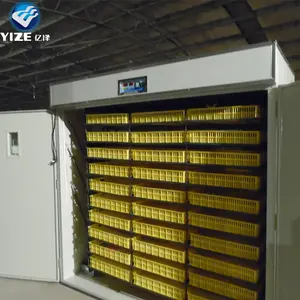


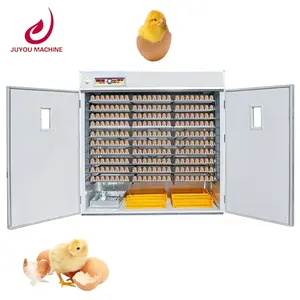



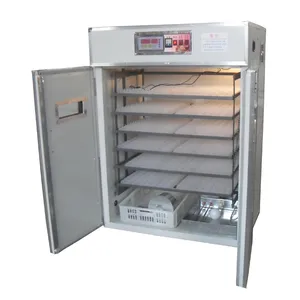






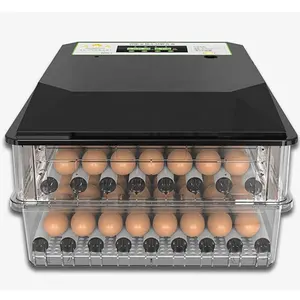

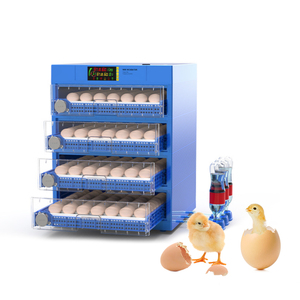





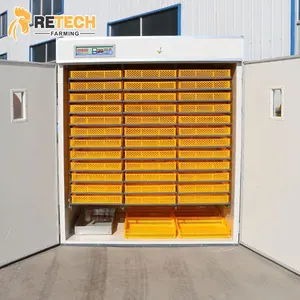
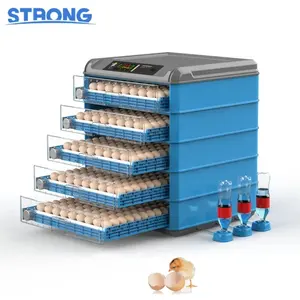


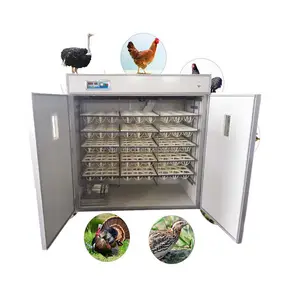


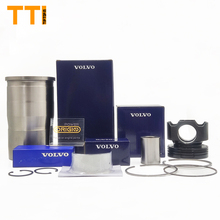

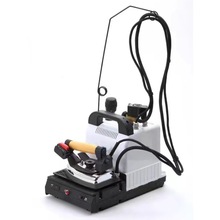



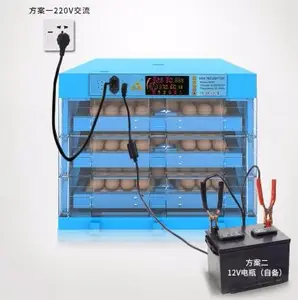
























 浙公网安备 33010002000092号
浙公网安备 33010002000092号 浙B2-20120091-4
浙B2-20120091-4